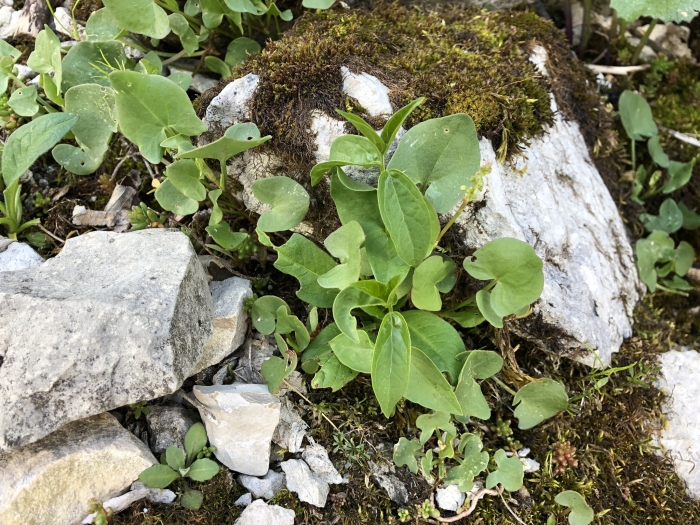French Sorrel
(Rumex scutatus)
French Sorrel (Rumex scutatus)
/
/

Jason Grant
CC BY 4.0
Image By:
Jason Grant
Recorded By:
Copyright:
CC BY 4.0
Copyright Notice:
Photo by: Jason Grant | License Type: CC BY 4.0 | License URL: http://creativecommons.org/licenses/by/4.0/ | Rights Holder: Jason Grant | Publisher: iNaturalist | Date Created: 2019-06-06T18:25:08-07:00 |























Estimated Native Range
Summary
Rumex scutatus, commonly known as French sorrel, is a perennial herb that is native to the mountainous regions of Southern and Central Europe, including the Alps and Pyrenees. It typically grows in meadows and grassy slopes, preferring well-drained, loamy soils. French sorrel reaches a height of 12-18 inches (30-45 cm) and spreads about the same width, forming a clump of slightly arrow-shaped, bright green leaves. The leaves are the most notable feature, used for their sharp, tangy flavor reminiscent of lemons, due to the presence of oxalic acid. Small, inconspicuous greenish flowers bloom in early summer, but the plant is primarily grown for its foliage.
French sorrel is valued for its culinary uses, particularly in French cuisine, where it is added to salads, soups, and sauces for its refreshing, tart flavor. It is hardy and tolerates a range of conditions, including frost and short dry spells, making it a low-maintenance addition to herb gardens and vegetable patches. It requires full sun to part shade and thrives in well-drained, fertile soil. Regular harvesting of leaves encourages new growth and prevents the plant from becoming woody. While French sorrel is not typically known for being invasive, it can self-seed and spread in favorable conditions, so gardeners should monitor its growth and remove flower stalks to control its spread.CC BY-SA 4.0
French sorrel is valued for its culinary uses, particularly in French cuisine, where it is added to salads, soups, and sauces for its refreshing, tart flavor. It is hardy and tolerates a range of conditions, including frost and short dry spells, making it a low-maintenance addition to herb gardens and vegetable patches. It requires full sun to part shade and thrives in well-drained, fertile soil. Regular harvesting of leaves encourages new growth and prevents the plant from becoming woody. While French sorrel is not typically known for being invasive, it can self-seed and spread in favorable conditions, so gardeners should monitor its growth and remove flower stalks to control its spread.CC BY-SA 4.0
Plant Description
- Plant Type: Herb
- Height: 1-1.5 feet
- Width: 0.75-1 feet
- Growth Rate: Moderate
- Flower Color: Green
- Flowering Season: Spring, Summer
- Leaf Retention: Deciduous
Growth Requirements
- Sun: Full Sun, Part Shade
- Water: Medium
- Drainage: Medium
Common Uses
Edible*Disclaimer: Easyscape's listed plant edibility is for informational use. Always verify the safety and proper identification of any plant before consumption., Low Maintenance, Rock Garden
Natural Habitat
Mountainous regions of Southern and Central Europe, including the Alps and Pyrenees
Other Names
Common Names: Shield-leaf Sorrel, Buckler-leaf Sorrel
Scientific Names: , Rumex scutatus, Rumex luxurians, Rumex madonae, Rumex rupifragus, Rumex scutatus subsp. glaucus, Rumex scutatus subsp. glaucus,
GBIF Accepted Name: